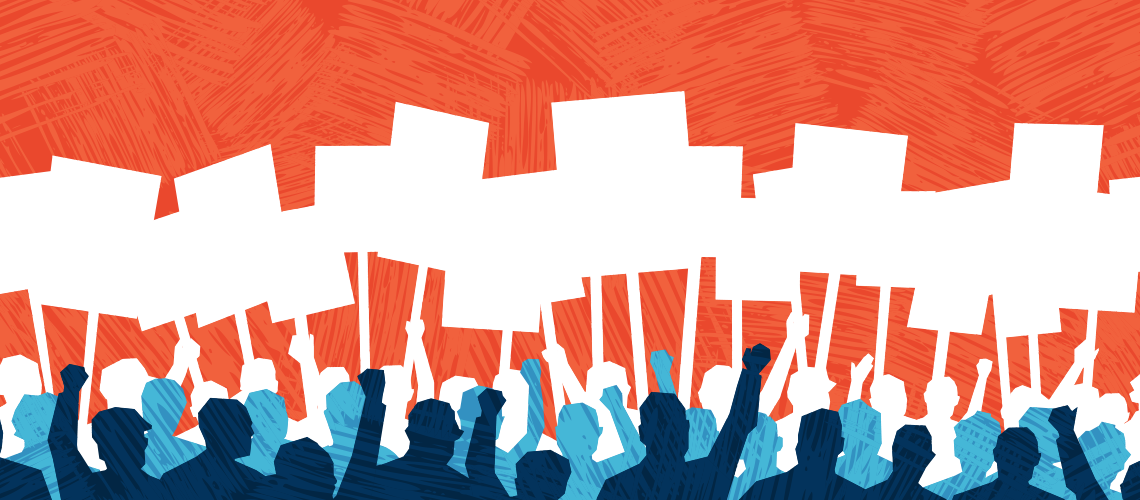Freedom of expression: attempts to quell US campus protests spark widespread international movement
William Roberts, IBA US CorrespondentMonday 27 May 2024

In April, Columbia University students set up a tent encampment protesting Israel’s war in Gaza. The very next day, with backing from university trustees, University President Minouche Shafik called in New York City police to clear the encampment. She said she did so ‘out of an abundance of concern for the safety of Columbia’s campus’. More than 100 students were arrested, making national news and sparking dozens of angry protests at other US colleges.
‘Academic freedom is fundamental in a democratic society’, says Anne Ramberg, Co-Chair of the IBA’s Human Rights Council and Chair of the Board at Uppsala University in Sweden, where students have protested peacefully. ‘Everybody in a university should have the right to express their view. The students, teachers and the professors have the same right of free speech.’
Ramberg adds however that this doesn’t mean that everything is permitted to be expressed. ‘There are limitations within the free speech concept’, she says. ‘If the students use hate speech, express anti-Semitic views or in other ways break the law it might well be correct to call in the police.’
As of mid-May in the US, more than 3,000 people have been arrested at protests on 61 college campuses, according to an Associated Press tally. Rather than quell dissent, the crackdowns have fuelled a large student-led protest movement that has spread internationally.
The First Amendment of the US Constitution declares that ‘Congress shall make no law […] abridging the freedom of speech, or of the press; or the right of the people peaceably to assemble’. The governing jurisprudence in the US is a 1969 Supreme Court ruling in Tinker v Des Moines Independent Community School District. The Court held that high school students had a right to wear black arm bands in protest of the Vietnam War, so long as their action didn’t substantially disrupt the operation of the school. Students do not ‘shed their constitutional rights to freedom of speech or expression at the schoolhouse gate’, the Court ruled.
Everybody in a university should have the right to express their view. The students, teachers and the professors have the same right of free speech
Anne Ramberg
Co-Chair, IBA’s Human Rights Council
While Tinker involved symbolic speech, the pro-Palestinian assemblies on college campuses today have intentionally tilted into civil disobedience. Expressing moral conscience, students are alleging occupation and genocide. They’re asking universities to boycott Israeli institutions and divest endowment funds from companies linked to the country.
More than 35,000 people have been killed in Israeli attacks on Gaza and 80,000 wounded, according to the Hamas-run Health Ministry in Gaza, in the period since 7 October 2023 when Hamas militants killed 1,139 Israelis and took dozens hostage.
At Columbia University, after police cleared the first encampment, students set up another. The protest swelled as professors joined students in outrage over the first police action. Students then barricaded a university building and rejected an administration offer of compromise. Again, city police were called in to make arrests and restore order. Graduation ceremonies were cancelled. The University’s faculty has now voted ‘no confidence’ in Shafik, who previously directed the London School of Economics.
Similar events have played out at other universities across the US as students set up tent encampments and administrators struggled to regain order. Earlier in May, at the University of California, Los Angeles, masked counter-protestors assaulted pro-Palestinian students with fireworks, pepper spray and sticks. Hundreds of student protestors were reportedly left to fight off the attack until police were eventually deployed. Gene Block, the University’s Chancellor, called the attack ‘utterly unacceptable’, labelling the counter-protestors ‘instigators’. The University is to establish a new office of campus safety to oversee its police department.
‘The core mission of the police in a situation like this is really to restore order, to remove the students from the buildings so that the students could go to class, so the university administrators can run the school’, says Matt Kaiser, Senior Vice-Chair of the IBA Criminal Law Committee and a partner at the law firm Kaiser in Washington, DC.
‘Police use of force has to be proportionate. It can’t be excessively violent. But they have a lot of discretion about how to carry that out’, he says. ‘Where you’ve seen a lot of criticism of police or criticism of administrators is about the extent to which they’ve been brought in quickly, when other means might get to a similar resolution without the same sort of level of confrontation or violence.’
At the University of Texas, police on horseback were sent in by the state’s governor to crush a planned protest by students who had walked out of classes.
Elsewhere, at Brown University in Rhode Island, protestors were arrested, and some held a hunger strike. But students cleared an encampment after the University agreed to hold a vote on divestment. Deals were reached between protestors and administrators at Harvard and Northwestern.
In televised remarks at the White House, US President Joe Biden said that ‘peaceful protest is in the best tradition of how Americans respond to consequential issues’. He added however that ‘neither are we a lawless country. We are a civil society, and order must prevail’.
Columbia University has dropped charges against its students. The school has a celebrated history of protests that tested the limits of free speech and pushed against establishment norms. In 1968, Columbia students protesting the Vietnam War occupied campus buildings and were violently removed by New York City police with tear gas and batons. More than 700 students were arrested and 130 injured in the melee. Again in 1985, hunger-striking students took over buildings for 21 days in an anti-Apartheid demonstration, successfully demanding the University divest from South Africa.
Image credit: TeddyandMia/AdobeStock.com
